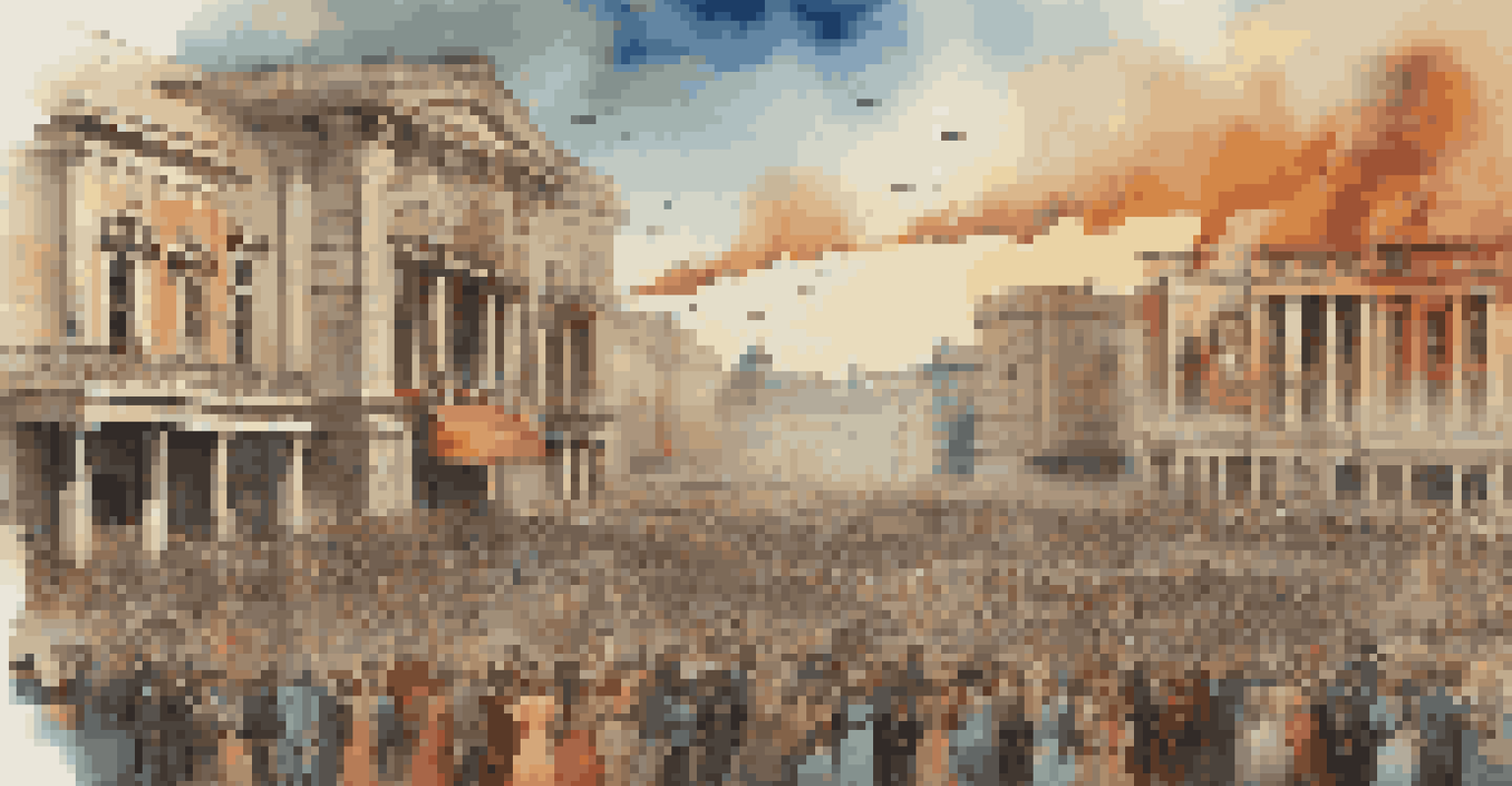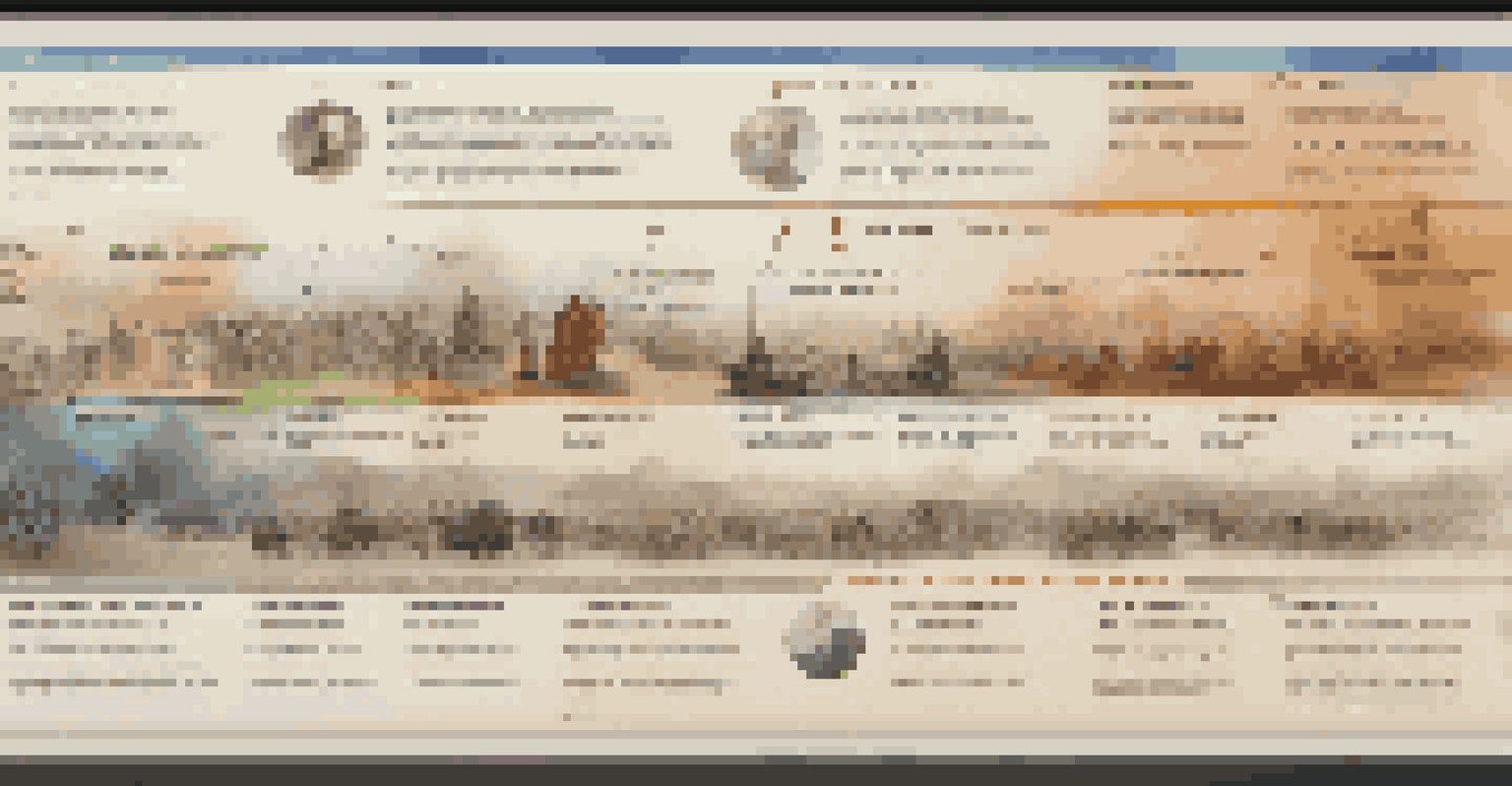Writing History in the Digital Age: Opportunities and Challenges

The Shift from Traditional to Digital Writing
The advent of digital technology has dramatically transformed how we write and share history. Gone are the days when historians relied solely on dusty archives and library visits. Today, information is just a click away, allowing writers to access a wealth of resources online. This shift has not only democratized access to historical data but has also changed the way stories are told.
The great thing about digital technology is that it allows us to democratize knowledge and share our narratives more widely than ever before.
With digital platforms, writers can present history in more engaging formats, incorporating multimedia elements like videos, podcasts, and interactive timelines. Imagine reading a historical account that comes alive through visuals and sounds; it makes the past more relatable and captivating. This accessibility opens up opportunities for diverse voices to share their interpretations of history.
However, this transition isn't without its pitfalls. The sheer volume of information available can lead to misinformation and poorly researched content. Writers must navigate this digital landscape carefully, ensuring that what they publish is accurate and credible, which can be a significant challenge in an age where anyone can share their version of history.
Opportunities for Collaboration in Historical Writing
Digital tools allow historians and writers to collaborate in ways that were unimaginable before. Online platforms enable researchers from different parts of the world to come together, share insights, and co-author works. This collaborative spirit can lead to richer, more nuanced historical narratives that draw from a variety of perspectives.

For instance, crowdsourcing projects like Wikipedia allow contributors to add their knowledge and expertise, making history a collective effort. This means that more voices, especially those from marginalized communities, can be represented in history writing. Such inclusivity is vital for a more comprehensive understanding of the past.
Digital Writing Transforms History
The shift to digital platforms democratizes access to historical data and allows for more engaging storytelling through multimedia.
However, collaboration also comes with challenges, such as varying standards of quality and reliability. Ensuring that all contributors adhere to a certain level of rigor and respect for factual accuracy is essential. Writers must navigate these waters carefully to maintain the integrity of their work while embracing the collaborative potential of digital platforms.
The Role of Social Media in Shaping Historical Narratives
Social media has become a powerful tool for disseminating historical narratives and engaging with audiences. Platforms like Twitter and Instagram allow historians to share bite-sized pieces of information, making history accessible to a broader audience. This immediacy and reach can spark interest and discussions that traditional formats may not achieve.
In the age of information, the challenge is not just to access knowledge, but to discern the truth within it.
For example, a historian may post a captivating photo from a historical event with a brief story, inviting followers to learn more. This interactive approach encourages dialogue and can lead to a deeper exploration of the topic. Social media can serve as a springboard for more extensive research and writing projects.
Yet, the rapid nature of social media can sometimes prioritize sensationalism over accuracy. Writers must strike a balance between catching attention and providing well-researched content. Navigating the fast-paced world of social media requires diligence to ensure that history is not only engaging but also factual.
Navigating Misinformation in Digital Historical Writing
The digital age has made it easier than ever for misinformation to spread, especially regarding historical events. With so many voices contributing to the conversation, distinguishing fact from fiction can be challenging for both writers and readers. This is particularly concerning when false narratives gain traction, leading to skewed perceptions of history.
Writers have a responsibility to verify their sources and provide context to the information they present. By doing so, they can help combat the misinformation that can proliferate online. This diligence helps build trust with their audience, reinforcing the importance of accuracy in historical writing.
Collaboration Enhances Historical Narratives
Online tools facilitate collaboration among historians, leading to richer narratives that include diverse perspectives.
Moreover, educating readers on how to critically evaluate sources is essential. Providing guidelines on distinguishing credible information from dubious claims empowers readers to navigate the digital landscape more effectively. Ultimately, fostering a culture of fact-checking and critical thinking benefits everyone engaged in historical discourse.
The Power of Multimedia in Telling Historical Stories
One of the most exciting opportunities of writing history in the digital age is the ability to incorporate multimedia elements. Writers can enhance their narratives with images, videos, infographics, and audio clips, creating a more immersive experience for readers. This multimedia approach can bring historical events to life in ways that text alone cannot.
For instance, a digital article about World War II could include archival footage, maps, and personal letters from soldiers, all curated to complement the written content. This richness not only engages readers but also caters to different learning styles, making history more approachable for everyone. It's like taking a virtual field trip to the past!
However, it's essential to use multimedia thoughtfully and ensure that it serves the narrative rather than distract from it. Writers should strive for a harmonious balance where text and media complement each other, enhancing the overall storytelling experience. When done right, this synergy can transform how we understand and connect with history.
Ethical Considerations in Digital Historical Writing
As writers navigate the digital landscape, ethical considerations come to the forefront. The ease of access to information can sometimes lead to unintentional plagiarism or misrepresentation of sources. Writers must be diligent in attributing their sources and respecting the work of others, fostering a culture of integrity in historical writing.
Moreover, when sharing stories from the past, particularly those involving sensitive topics, writers should approach their subjects with care and empathy. This means considering the perspectives of those affected by historical events and acknowledging the complexities of their experiences. Ethical storytelling enriches the narrative and honors the individuals involved.
Misinformation Challenges Writers
The abundance of information online makes it crucial for writers to verify sources and educate readers on evaluating credibility.
Finally, as more people engage with digital platforms, writers have the opportunity to influence public perceptions of history. This power comes with the responsibility to promote accurate representations and challenge harmful narratives. Consciously choosing to uplift marginalized voices is crucial in creating a more inclusive historical discourse.
Looking Ahead: The Future of Writing History Digitally
As we look to the future, the landscape of writing history in the digital age will continue to evolve. Emerging technologies, such as artificial intelligence and virtual reality, have the potential to revolutionize how we document and experience history. These innovations could allow for interactive experiences that immerse users in historical events as if they were actually there.
Writers will also need to adapt to changing audience preferences, with younger generations increasingly turning to digital content for their historical insights. This shift presents a unique opportunity for writers to engage creatively, using formats that resonate with modern readers. Think of history blogs, YouTube channels, or interactive websites that captivate and inform.

However, challenges will undoubtedly persist, particularly concerning the accuracy and ethical implications of using new technologies. Writers must remain vigilant in their commitment to authenticity while embracing innovation. The future of writing history digitally holds great promise, and with thoughtful engagement, we can ensure that it enriches our understanding of the past.